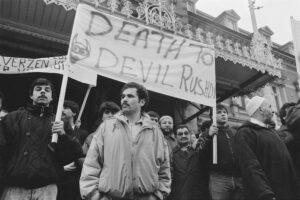Cash shortage may curb Egyptians’ Ramadan excesses
Egyptians have begun the annual Ramadan fast amid signs that the belts of the faithful may stay tighter than usual this year.
Ramadan, the month of austerity and fasting during which no food – and not even a cigarette – may be consumed until sundown, tends to be an orgy of consumption when fasts are broken after dark. Egypt's Supply Ministry has released extra foodstuffs into the market to cope with pre-Ramadan demand.
Yameesh – mouth-watering Ramadan delights that go into an endless array of dishes – flood the market. Apricot rolls, nuts, almonds, coconuts, dates, spices, meats, special sauces and konafa (a Ramadan dessert) fill the shops. Tantalising aromas waft out of open windows to tempt the fasting passerby.
When night falls, such goodies are consumed in startling quantity. “Forbidden fruit is ripe and so the temptation to overeat, especially at the beginning of Ramadan, is irresistible,” said Wael Abdel-Hadi, a Coca-Cola salesman.
This year, however, retailers are reporting food sales sharply down. “For every 10 people buying yameesh last year there are only a couple this year,” Mohamed Mustafa, manager of a popular supermarket in the Mohandissen district, complained.
He said the Union of Traders, representing retailers, had been meeting in recent weeks to work out how to boost pre-Ramadan sales apparently depressed by a liquidity crunch. Consumer pockets have been hit by a slowdown in the Egyptian economy over much of the past year caused largely by dollar and pound shortages and high interest rates.
Prices have been cut. According to al-Gomhouria newspaper, Ramadan food treats cost 20% less than last year. The lower demand might not be all bad. Nutritionists say it is unhealthy to eat prodigiously when breaking a fast. “It's not good for your car if you drive off without warming it up first. The same goes for your body,” said a doctor at a charity hospital.
Islamic teaching agrees. It says the Prophet Mohammed would break his fast with a few dates and some water and then pray, to give his stomach a chance to function properly.
Chance for charity
The liquidity crunch may also limit the lavishness of “Muwa'd al-Rahman” (Tables of Mercy). These are charity food tables set out on pavements, jamming many street corners during Ramadan, where the poor, or any passerby for that matter, can break their fast for free.
Politicians, celebrities, businessmen, community leaders and wealthy professionals compete to set up large and prominent Tables of Mercy stocked with filling fare.
One charity, Fathit Kheir, takes the idea one step further by providing a meals-on-wheels scheme for the needy all year round. For Ramadan, it plans to distribute bulk supplies to the poor to last them the whole month.
Ramadan is one of Islam's holiest seasons, beginning when the new moon is sighted. The devout – and often their not-so-devout co-religionists – do not eat, drink, smoke or have sexual intercourse in the hours from dawn to sunset. It is the ninth month of the lunar Islamic calendar and arrives 11 days earlier each year. For the last few years, Ramadan has fallen in Egypt's winter months when shorter days and gentler temperatures make fasting a less arduous exercise than when it occurs in summer.
The devout see Ramadan as a chance to exercise austerity, charity and get closer to Allah. “For someone who fasts there are two great joys of Ramadan: first, when he breaks his fast and, second, when he meets Allah,” said Hassan, an office-worker, quoting a traditional saying of the Prophet.
For many Egyptians, Ramadan means fasting and restraint by day and feasting and revelling by night. It is also supposed to be a month for displaying greater tolerance and charity to those around you. This is not always evident in the last half-hour of the fast, when irate motorists are racing home for their Iftar (breakfast). “The streets get extremely busy, people are hungry and many crave a cigarette,” said office-worker Ayman Khatib.
But some Cairo residents have come to terms even with the Ramadan traffic nightmare. “I feel very calm on my way home,” said Abdel-Hadi. “The traffic is annoying, but I feel content because I know that I am on my way home to break my fast.”


